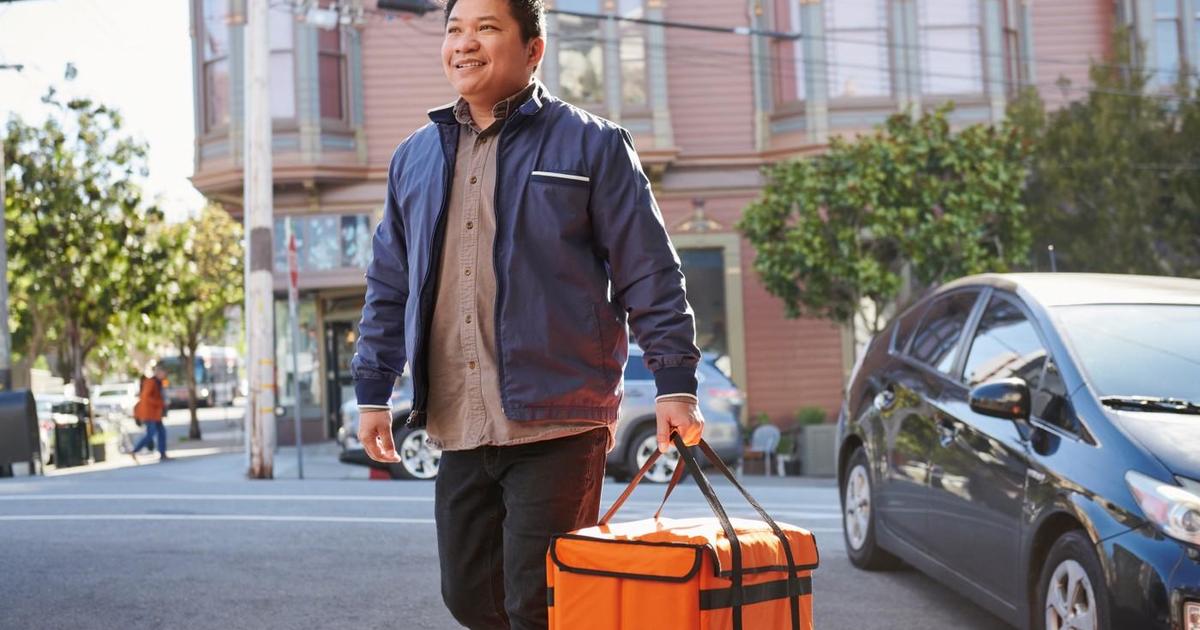DoorDash’s dizzying launch as a public company this week made instant billionaires out of the tech platform’s three founders. But Wall Street may as well be on a different planet for DoorDash’s fleet of delivery workers, who aren’t necessarily reaping any additional rewards, even as investors valued the company at more than $70 billion.
The initial public offering — one of the hottest of 2020 — caps a year of explosive growth for the San Francisco company, which has benefited hugely during the pandemic as homebound diners have increasingly relied on deliveries to their door.
Lockdown orders and the closure of indoor dining have made DoorDash indispensable for restaurants as well. DoorDash reported revenue of $1.9 billion in the first nine months of 2020 alone.
But the headline-grabbing IPO has also revived negative media accounts of the low wages endured by DoorDash’s workforce. One local outlet in New York City calculated it would take two days for a DoorDash worker to earn the price of a single share of the company, closing at around $190 following its stock debut Wednesday. And that’s on a very good two days: “This morning, I earned $40 for four hours of work,” deliveryman Williams Sian told The City.
The company’s soaring IPO prompted others to decry what they call yet another example of the ever-widening gap between the wealthiest Americans and those at the bottom, particularly in New York City, where not being able to use the washrooms at the restaurants they make their deliveries from is among the indignities Dashers and other food delivery workers often face.
One council member, Justin Brannan, called the IPO “yet another example of the rich getting richer during #COVID on the backs and bicycles of the working and immigrant poor.”
Talk about a tale of two GALAXIES.
First day shares of @DoorDash soared yesterday, valuing the company at $72 BILLION.
Yet another example of the rich getting richer during #COVID on the backs and bicycles of the working and immigrant poor. https://t.co/wJcXNNCpzi
— Justin Brannan (@JustinBrannan) December 10, 2020
DoorDash’s fleet of Dashers are not getting any equity in the company, but DoorDash has announced a $200 million workforce development program that apparently includes some cash for workers. “Later this quarter we will be announcing details of a $12 million Dasher rewards program that will run though May 2021,” the company stated in a blog post a month ago.
While the company isn’t detailing just how the program works, there are roughly a million Dashers around the globe, according to DoorDash’s IPO filing, which means that $12 million amounts to a $12 bonus if doled out equally.
“Nationally, Dashers earn an average of over $22 per hour they’re on a job, including 100% of their tips. As part of our $12M Dasher rewards program, [globally] many of the most active Dashers yesterday received between $300 and $20,000 in their local currency,” a company spokesperson emailed CBS MoneyWatch.
In the United States, Dashers who’ve provided at least 5,000 lifetime deliveries were paid between $500 to $20,000 on Wednesday, based on the number of deliveries. The company declined to elaborate on how many workers received the extra cash.
To attract and retain Dashers, DoorDash has offered monetary incentives and perks including “credits to be used for orders on its platform and free DoorDash-branded apparel,” according to its filing.
The company, which launched in 2013 and operates in more than 4,000 cities across the U.S., as well as 80 cities and towns in Canada, and a growing number in Australia, has had its share of unwelcome attention. A New York Times story last summer sparked public outrage in detailing DoorDash deliverers’ meager pay and tough working conditions.
More recently, DoorDash agreed to pay $2.5 million to resolve allegations that it misled consumers in the District of Columbia and misused tips consumers believed were intended for workers.
DoorDash was a major contributor to lobbying efforts on behalf of a measure approved by California voters in November declaring workers for platforms like Doordash, Uber and Lyft be classified as independent contractors rather than employees entitled to minimum wage and benefits such as sick pay.
